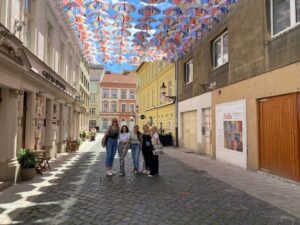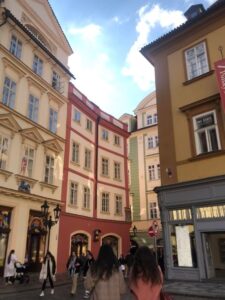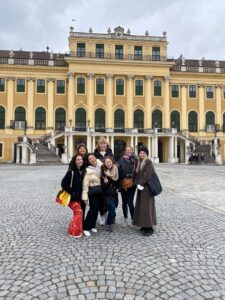Top Tips from Prague
Lucia, a former Global Office Intern, studied History and went on a Study Abroad placement at Charles University, Prague during Semester Two 2021-2022. She kindly created this post to share her recommendations for studying abroad in Prague, and elsewhere. See her advice below.
There were a few things which I did in Prague that greatly benefitted my overall experience, and so I wanted to share them in the hopes that this would help anyone studying abroad, whether in Prague or elsewhere!

1. Get involved with Buddy Programmes
If your University offers it, I advise you to sign up for a Buddy Programme, or get in contact with other St Andrews students studying in the same city. Particularly when you first move, it’s great to have some connections, in case you need advice on the health care system, visa processes, or where to buy certain things.
It can also, of course, lead to wonderful friendships. My Buddy showed me all around the city and became my go-to contact for when I was in the mood for Czech Dumplings! It’s great to know someone more experienced to help you out. And – who knows? – maybe they’ll even be a great friend.
When you return back to St Andrews, we also offer a buddy scheme where we match inbound student to those returning from that country, so you’ll have your chance to return the favour!
2. Be brave! 😊
One of the scariest things I did when I was abroad was joining an Erasmus day-trip to a nearby city, all on my own. But this is where I ended up meeting my closest friends! It’s really important to put yourself out there. The greatest connections may not come from absolutely everything you do, but isn’t it worth a try? Worst case scenario, you’ve still had a chance to see around and gain new experiences!
The Erasmus Student Network in Prague host great opportunities and events for international students. Give them a follow on social media to see what they offer!

3. Academics
There was a huge difference between teaching styles at Charles University and at St Andrews. In Charles, the classes could range from St Andrews-sized tutorial groups to groups of up to around 40 students (much bigger than I was used to). Being in classes designed for Erasmus students was a great way to learn more about history as a global discipline and hear different perspectives from around the world. This was especially enlightening in a class about the Cold War, as students from the ‘east’ and ‘west’ discussed what perceptions they had had, and what they had been taught.
The examination style in Charles was very new to me. Some of my exams took the form of a face-to-face discussion, which I had never done anything like before. However, I ended up really loving it; it was so insightful to discuss major issues with my tutors and doing so really built my confidence. As opposed to written examinations, discussions allowed me to explore the issues I found interesting about the course and lead the conversation into my personal interests. I am confident to say that I came away from Charles University as a better historian.
One little piece of advice I would give to anyone heading to Charles is not to stress if you feel that you aren’t being given all the information you need, regarding grades, exams, or whatever else. I feel that the University is slightly more laid-back than St Andrews in this aspect, and so whilst it feels like you’re being left in the dark, you really know as much as anyone else. If you are worried, just talk to your tutors, and I’m sure they will reassure you. Studying at Charles isn’t necessarily any harder or easier than St Andrews, it’s just different, and that can definitely be a bit of a shock!
It could be helpful, no matter where you study abroad, to make sure to chat to your tutors regarding the Grade Conversion process. Don’t leave it until after the Semester ends – if they know all along, then they’ll be better prepared to give St Andrews the info it needs!

4. Accommodation
I lived in private international dorms called The Fizz. I absolutely loved it! The facilities were great, they planned wonderful events (including a wine tasting trip, a neon disco and ‘Summer Olympics’), and it was a fantastic way to meet other international students. The Fizz isn’t just a Prague thing – you can find their accommodation in a whole bunch of locations. Worth a Google to see if it’s for you!
Although I loved my University-provided accommodation during my Study Abroad in Oslo, I know that experiences differ amongst different partner Universities. My best advice is to get in touch with past students (send the Global Office an email if you’d like to!) and see what they thought.
A private flat could also be a great option for some independence and the opportunity to live with other expats or natives. However, in big cities like Prague, scams are common – make sure to be vigilant!
Overall, your accommodation is what you make it – try to be a good flatmate, make your room as homey as possible, and enjoy it while you’re there 😊

5. Learning the Language
The Czech language is notoriously difficult. Although all my classes were in English, I was surprised at the number of times I couldn’t get by on English alone in the city. A few phrases such as “Hello”, “Yes/No”, “Thank you”, and “Do you sell this?” (accompanied by a picture of what you need) can be useful. I also think it’s a great idea to sign up to Czech Beginners’ classes. Charles University offers these for free. Not only is this a helpful way to learn the basics, but it also is a nice way of meeting other international students who are in the same boat! At the end of the day, knowing a bit of the language will just make your experience a little bit smoother. If you’re able to learn before you go (perhaps using language-learning Apps such as DuoLingo), it will aid the initial transition into a new country.
I also recommend language classes as they can be a great space to learn about culture and Czech traditions, and ultimately get involved in your host country.

6. Transport & Discounts
Downloading the App PID Litaka is the easiest way to get tickets, and it offers a student discount. You may know this already, but when you buy a ticket, make sure to activate it! My first ever time on a tram on Prague (coming straight from the airport with suitcases in tow), I was in so much of a rush to hop on that I forgot to press ‘activate’. An 80 pounds fine on my first day… but, at least I never forgot again!
Public transport is really easy to use in Prague. It is efficient, and tends to run on-time, with many night-riders also available. If you’re ever stuck, Bolt is a really useful app to download (like Uber, but usually cheaper).
Cost of living in Prague is already pretty low, but for cheap deliveries (either on groceries or from restaurants), Wolt is great! If you choose to stay at the Fizz, there is one only 30 seconds away from the door – very convenient!
When you arrive at Charles, you’ll have the option to pay 10 pounds to get an ISIC card instead of a regular student card, and I really recommend paying it because of the money you can save on trainlines like RegioJet if you want to travel outside of Prague. You can also use the ISIC card for discounts in a variety of places within Prague and wider Europe.
7. Support Network
Most of all, it is important to remember that the University is here to help you. Even in the safest cities, sometimes things can happen. It’s important to be as vigilant as you can – taking the safest routes home, travelling with friends, and so on. You are always a St Andrews student, no matter where you go, and the Global Office is there to help. Make sure you have their contacts saved in case you need.

8. Travel! And make the most of your city
One of my absolute favourite things about Prague is how centrally located it is in Europe. It was so easy to take a quick train journey into another country. I spent weekends and the Easter break interrailing, and visited Austria, Bratislava, Kutna Hora, Biel/Bienne, Bern and Budapest. It’s also quite cheap to do so. If you have the chance, it’s a great way to make the most of your time abroad. If not, it is at least important to see around the city. Walking tours can be a wonderful way to meet other students, and sometimes organisations such as the Erasmus Student Network offers these for free (or, at least, quite cheap). Prague is also brilliant for the vast range of things to see and do – you’ll certainly never be bored! Food-wise, there are an abundance of traditional Czech restaurants, tea houses, dessert places, and so on. There are so many bars and clubs, it would be impossible to get around them all. Prague is the home to many wonderful places to hike and has an abundance of historical sites to see.
See some of my top recommendations below.
Top Recommendations in Prague
- National Museum – particularly if you’re into history
- Riegrovy Sady – the ‘sunset hill’
- Knedlin – for Czech dumplings (hands-down the number 1 thing I miss about Prague!)
- “Dog’s Bar”
- Crème de la Crème – for vegan lavender ice cream!
- Watch the sunrise on Charles Bridge
- Go to the markets if you’re there at Christmas or Easter time
- If you’re there over Summer, you can also rent a pedal boat around the Vltava river!
Thank you to Lucia for sharing her advice and experience with us. If you would like to know more about Lucia’s experience, or about Study Abroad in general, please email [email protected]